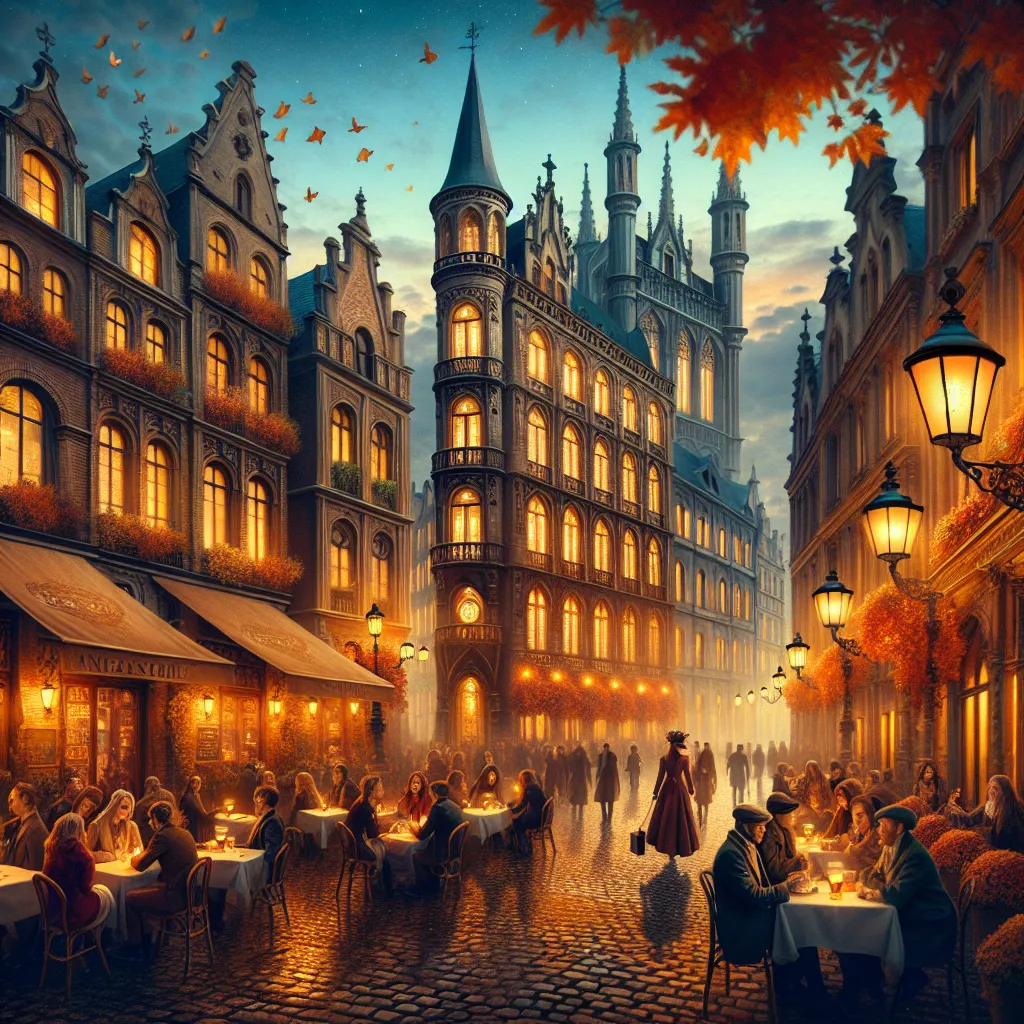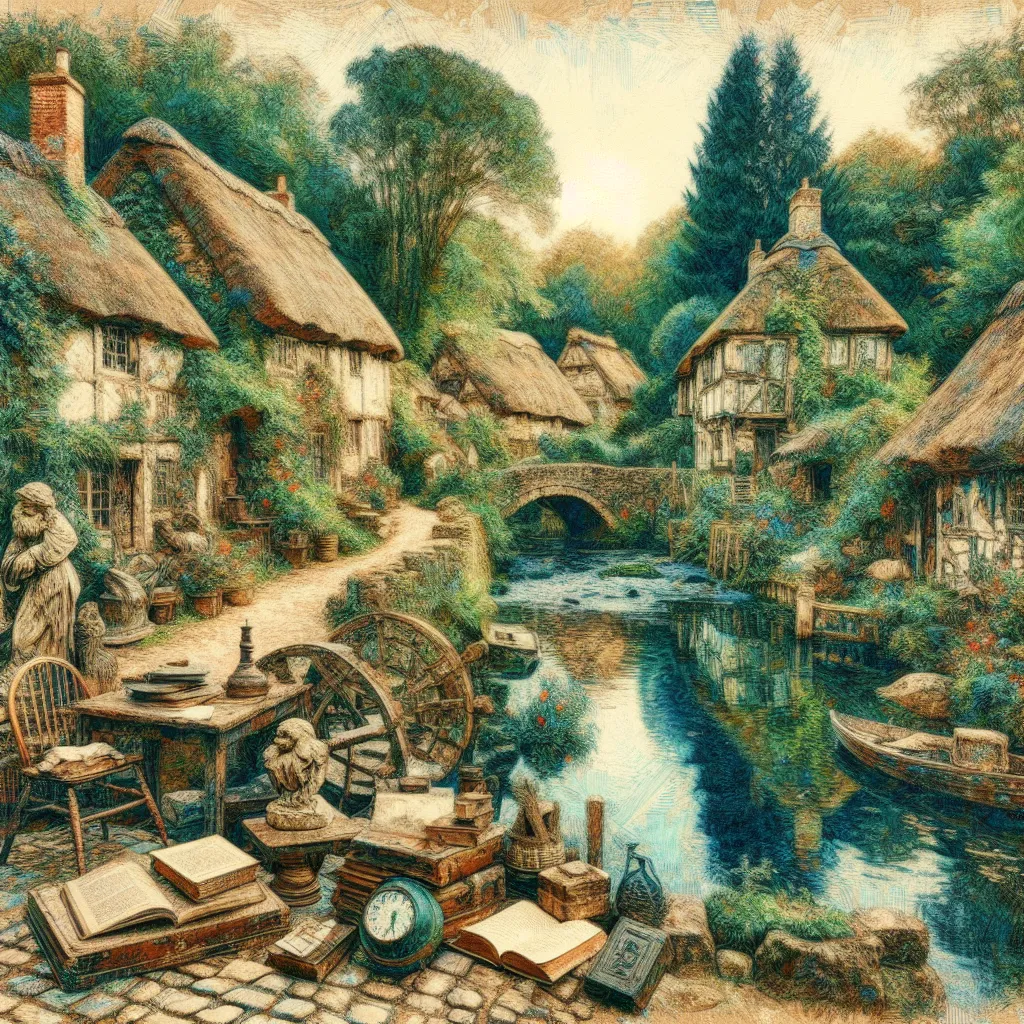How did Russian writers find inspiration abroad?

- How have the foreign travels of Russian authors influenced world literature?
- How did Bougival and European cities influence Russian writers?
- How did Europe influence the works of Gogol and Bunin?
In this article, we explore the foreign travels of Russian authors and their influence on world literature, as well as how they perceived life in European cities.
The Journey of Alexander Pushkin
It is noteworthy that the great Russian poet Alexander Pushkin left the borders of the Russian Empire only once, when he traveled to Turkey with the Russian troops. This one trip did not halt his creative flow, and he continued to produce his wonderful works, in which he described both his native landscapes and foreign scenery, as if he had spent many years there.
The Travels of Nikolai Gogol
Nevertheless, other writers, such as Nikolai Gogol, were able to explore different corners of Europe more freely and gain unique experiences. Gogol spent almost twelve years abroad, starting in 1836 when he traveled to Germany and Switzerland. It was during these years that he worked on such famous works as:
- "Taras Bulba"
- “Dead Souls”
An interesting fact: the inspiration for Gogol's last work came from Pushkin, who, as previously noted, was unable to leave his country. Additionally, Gogol used his time abroad to improve his health by visiting thermal springs at resorts in:
- Karlovy Vary
- Baden-Baden
- Marienbad
- Ostend
Memory of Gogol
In Karlovy Vary, there is a commemorative plaque in honor of Gogol, installed on the building of the "Kolonada" hotel where he stayed. There is also a trail named after him, reminding us of the significant contribution this writer made to Russian literature.
Paris as an important part of the lives of authors
It is definitely worth mentioning Paris — a city that has become an important part of the lives of many Russian authors. Gogol mentioned Paris in his notes after visiting it in 1837 and living on Place Bourse for several months. Ten years later, in 1847, Ivan Turgenev found himself there as well, having returned to Europe after three quiet years in Germany, and he ended up in the midst of the revolutionary upheavals of February 1848.
Dangerous events
He witnessed dramatic events: clashes, barricades, and the loss of life, which had a profound impact on his views about the revolution.
Buzhival and its significance
In 1863, another writer, Bougival, settled in Baden-Baden, where he met prominent literary figures from Germany, France, and England, introducing them to the contemporary Russian literature. Later, in 1874, Turgenev built his own house in Bougival, a suburb of Paris, which harmoniously combined elements of a Swiss chalet and a traditional Russian izba. This house became his retreat, where he remained until his death in 1883.
Result
Thus, foreign trips and resorts have left a significant mark on the lives and works of these literary geniuses. Their travels not only enriched their knowledge of other cultures but also inspired them to create works that continue to attract readers to this day. By enriching Russian literature and broadening its horizons, these writers have left a profound impact on world culture.
The historical significance of Buzhivale.
In the past, this small town became known as the "cradle of Impressionism." It served as a source of inspiration for outstanding artists such asClaude MonetandAuguste Renoirwho created their famous masterpieces here. In addition, Bougival attracted many outstanding individuals who were friends withBy Turgenevamong which were such notable figures as:
- Émile Zola
- Vladimir Sologub
- Mikhail Saltykov-Shchedrin
- Vasily Vereshchagin
- Camille Saint-Saëns
- Georges Bizet
These days, in a building on a street named after the author of the famous novel "Fathers and Sons," there is a museum dedicated to Turgenev.
Dostoevsky's first visit abroad
When Fyodor Dostoevsky first traveled abroad after turning forty, his first foreign city wasBerlinThis place had become quite familiar to him, and he had returned there more than once. By his own admission, Berlin reminded him of St. Petersburg: “...an astonishing resemblance to Petersburg... Did I spend two days seeing what I had run away from? Even the linden trees here didn’t please me, although the locals are willing to pay a lot of money for their preservation...”
Opinions about Geneva and London
On the contrary, Geneva left the writer with only negative feelings: "In all my life, I have never encountered anything more gloomy and dreary than this Protestant city. People do not live here; they merely spend their days, as if in a penal colony."
London left a more positive impression on Fyodor Mikhailovich.
“This chaos, which is actually a bourgeois order, this foul-smelling Thames, the air thick with coal dust, the magnificent parks and avenues, as well as the gloomy corners of the city… The City with its multimillion population and global trade… Something has already been created here, there is a sense of success, a triumph… But it makes one ponder… Is this really the ideal we were striving for? Is this not the end of it all?”
The author's deep reflections on how many Russian people in the 20th and 21st centuries will change their places of residence and move to these regions are hard to overestimate.
The popularity of Baden-Baden among Russian writers
It cannot be overlooked thatBaden-Baden, which, along with Paris, has become a favorite place for many Russian writers.


Sale flat in Saint-Aubin-les-Elbeuf with city view 85 847 $

2 Bedrooms

1 Bathroom

68 м²


Dostoevsky first visited this famous resort in 1863, and in 1867 he spent several weeks with his wife in a house located near a forge. It was during this time that Fyodor Mikhailovich often complained about the noise that disturbed his creative process. This picturesque and multifaceted city left an indelible mark on the souls of many Russian authors, becoming a place of inspiration and tranquility for them.

Gogol's connection to Frankfurt am Main
In Frankfurt am Main, it is important to note the significance of this city for Nikolai Gogol, who had the opportunity to frequently meet with Vasily Zhukovsky, his close friend. Zhukovsky, who was not only an outstanding poet but also a renowned educator, had a significant influence on the life of the future Emperor Alexander II.
He also created a unique educational program for the tsarevich, which included trips to Siberia and Western Europe. From 1844 to 1848, Vasily Andreyevich lived in the luxurious Metzler villa, located on the picturesque banks of the Main River, with his German wife, Elizabeth Reitern.
Today, this magnificent architectural landmark has become the home of a museum of applied arts.
- Museum address:Shaumainkai, 15
Gogol inRome
Rome also played a significant role in Gogol's life, as he spent five years of his life in this city. He lived near the famous Spanish Steps at Via Sistina, 125.
In his letters, Gogol detailed the route to his residence:
“From Plaza de España, go up the stairs and turn right. On the right side, there will be two streets; choose the second one; it will lead you to Piazza Barberini. From this square, there is a street that goes up to the boulevard, and if you keep going up, you will reach Isidoro; there you need to turn left. Directly across from Isidoro is house number 16 with the sign 'Appartements meublé'. This is where I stayed.”
In this Roman house, Gogol worked on his greatest works, such as "Dead Souls" and "The Government Inspector," while also finishing "The Overcoat."
Bunin and his time in Europe
Let's take a leap through time and find ourselves in the 20th century, when Ivan Bunin, another famous Russian author, also enjoyed traveling abroad. In 1907, he spent two months exploring Eastern countries, including the holy sites that Gogol had visited in 1848.
In 1920, while aboard the French steamer "Sparta" en route to Paris, Bunin also passed through Constantinople and then visited Bulgaria and Serbia.
From 1922 until his death in 1953, Bunin lived with his wife Vera in Paris at 1 Jacques Offenbach Street.
Summer months in Grasse
In the summer, the writer moved with his family to Grasse, to the Villa Belvedere, located in the Maritime Alps at 18 Chemin du Vieux Logis. During this time, they were regularly visited by acquaintances from Russia, who brought with them black bread, fragrant Antonovka apples, and linden honey.
It was in this place that Ivan Alexeyevich began working on his famous prose work "Dark Alleys." However, with the onset of World War II, the writer had to leave Belvedere and move to the neighboring villa Jeanette, which was prompted by rising housing prices and an increase in the number of new tenants in his former home.
In the new villa located at 35 Georges Clemenceau Boulevard, Bunin continued his creative work and produced new works during this challenging time for Europe.
Conclusion
In conclusion, the travels of Russian writers abroad open up not only geographical horizons but also deep layers of their creative quests and inner worlds. Each of them, whether it be...Pushkin,Gogol,TurgenevorDostoevsky...absorbed the cultural diversity and unique characteristics of the places he had the opportunity to visit.
Paris, Berlin, London, and Baden-Baden became not just final destinations of their travels, but also important milestones in their literary evolution.
The influence of travel on creativity
In these cities, they not only sought inspiration and healing for their emotional troubles but also witnessed historical events that left an indelible mark on their works. World literature has been enriched by their experiences and emotions, allowing us to better understand and appreciate their contribution to Russian and global culture.
Literary heritage
As the author of this article, I feel a deep connection with these great writers. Their stories, filled with struggle, passion, and discovery, inspire me in my own literary pursuits. I hope that by exploring their international experiences, we can not only deepen our understanding of their work but also open new avenues for self-expression and creativity in our modern world.
- TravelWriters were important for their creativity.
- Cultural influencesTheir works have been enriched.
- Historical eventsleft a mark in their works.
- Connection with writersinspires new literary explorations.
Continuation of the journey
These writers, who have united several cultures, have become bridges between nations, and their legacy continues to live among us, inspiring new generations. We can learn a lot from their courage, tolerance, and pursuit of truth. Journeys into the unknown, as their examples show, can open not only new places but also new horizons in our understanding of life. Let us continue their path, refreshing our souls and minds in the search for artistic truth.
Tags
Comment
Popular Posts
9 October 2024
283
9 October 2024
3504
Popular Offers




Subscribe to the newsletter from Hatamatata.com!
Subscribe to the newsletter from Hatamatata.com!
I agree to the processing of personal data and confidentiality rules of Hatamatata




